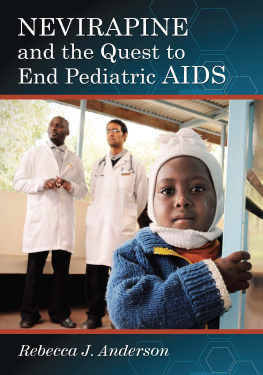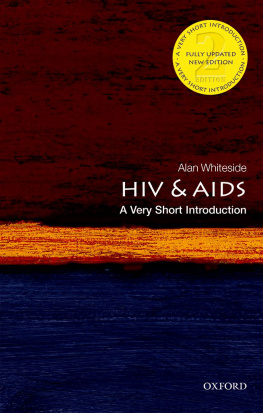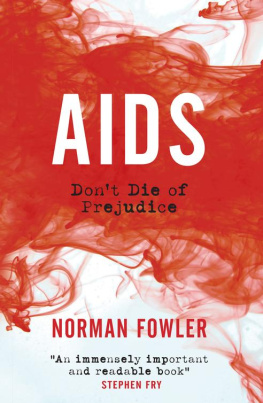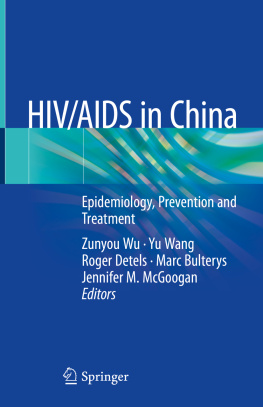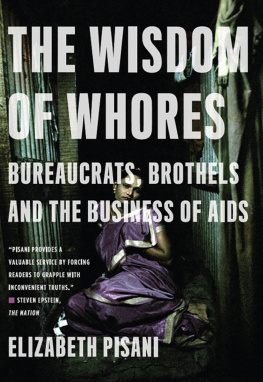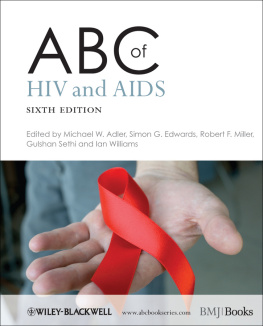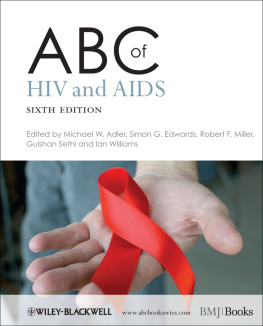LETHAL DECISIONS
LETHAL Decisions
The Unnecessary Deaths of Women and Children from HIV/AIDS
ARTHUR J. AMMANN, MD
Vanderbilt University Press
Nashville
2017 by Vanderbilt University Press
Nashville, Tennessee 37235
All rights reserved
First printing 2017
This book is printed on acid-free paper.
Manufactured in the United States of America
Library of Congress Cataloging-in-Publication Data on file
LC control number 2016007503
LC classification number RC606.5
Dewey class number 362.19697/92dc23
LC record available at lccn.loc.gov/2016007503
ISBN 9780-826521248 (hardcover)
ISBN 9780-826521255 (paperback)
ISBN 9780-826521262 (ebook)
TO MY WIFE who throughout the thirty-five years of the HIV/AIDS epidemic stood by me, encouraging, listening, and understanding the human toll of a new epidemic that unfolded before us. She partnered with me to establish Global Strategies for HIV Prevention, addressing issues of injustice and inequity among vulnerable women and children in poor countries. She shared in the compassion to help those whose voices could not be heard yet suffered so much. To my children, Kimberly and Scott, who grew up listening to conversations about the HIV/AIDS epidemic and who balanced patience with encouragement for a father who often traveled away from home. To my grandchildren, Sophia, Caleb, Leland, and Avery, who listened to stories about the HIV/AIDS orphaned children and did what they as children could do to help. They were constant reminders of how precious the life of each child must be.
TO THE MOTHERS who always held out hope that the prevention and treatments that were transforming the lives of those in wealthy countries would reach them to save their lives and the lives of their infants. To the thousands who participated in clinical research studies, always giving of themselves and hoping that their participation would help those in their communities and around the world. This book is to honor their disappointments, their lives, their courage, and their sacrifices.
CONTENTS
FOREWORD
In the aftermath of cataclysmic events a witness often comes forth to tell us how it came about and point to pivotal opportunities that would have minimized its impact. Dr. Arthur Ammann, the doctor who identified the first cases of AIDS in children and the transmission of HIV by blood transfusion, is such a witness.
Lethal Decisions is his highly personal account of an ongoing disaster, the global HIV epidemic in children and mothers, and the worlds fatally flawed response. Dr. Ammann was uniquely positioned for this role. A medical school professor and expert in the diagnosis of immune deficiencies, he was there at the beginning of AIDS and stayed involved for the life of the epidemic. In my opinion he is the successor to the late Elizabeth Glaser as the conscience of the pediatric HIV epidemic.
Before meeting him in the context of AIDS, I knew of him through his contributions to the medical literature in the area of inherited immunodeficiency diseases. Dr. Ammann and others of his generation were my role models in choosing to become an immunologist. Lethal Decisions chronicles his odyssey from doctor and laboratory scientist to the medical and geopolitical frontlines of the HIV epidemic. His medical care of some of the first patients and their mothers led to an intense and enduring commitment. Present at every pivotal moment in the history of pediatric AIDS, his goals were common to those of many doctors in the field: understanding the differences between pediatric and adult AIDS, discovering how to prevent mother-to-child transmission, and learning how to treat children who were already infected. He was instrumental in the establishment of non-profits that addressed these questions, including the Elizabeth Glaser Pediatric AIDS Foundation with its novel Think Tank retreats and the American Foundation for AIDS Research (amfAR).
The 1990s were a time of milestones in HIV treatment and prevention. In the study known as ACTG 076, published in 1994, mother-to-child transmission of HIV was reduced by a dramatic 60 percent, and at the 1996 International AIDS Conference in Vancouver, British Columbia, it became clear that HIV could be suppressed with protease inhibitors as part of an antiviral cocktail. This discovery led to a marked decline in the number of deaths from AIDS in the developed world.
Aware of urgent, unaddressed needs in resource-poor countries and frustrated by the slow pace of intervention by the international community, Dr. Ammann founded Global Strategies in 1998 with the mission of bringing advances in health care to frontiers of the epidemic that were untouched and in fact shunned by other agencies. His goal was to ensure that advances in treatment and prevention reached the most vulnerable children and women living in remote and sometimes war-torn placespoor, stigmatized, and at risk for sexual violence.
In Lethal Decisions, Dr. Ammann documents the inexcusable missteps that delayed the translation of advances in care to the resource-poor settings of sub-Saharan Africa where nearly twenty million people had already died by the time Global Strategies was founded. He makes the history of HIV/AIDS in children come alive from its very earliest days to the present, complete with its heroes, heroines, and villains. No one is better qualified to tell this story.
Michael Gottlieb, MD
Los Angeles, California
Dr. Gottlieb identified the Acquired Immunodeficiency Syndrome (AIDS) as a new disease in 1981.
ACKNOWLEDGMENTS
It would be a dishonor if I did not first acknowledge the women and children of the epidemic who suffered so greatly from a disease that they too often did not understand. They volunteered for research that often benefited others more than it benefited them. In spite of their suffering, they continued to care for their families while embracing the hope that a means to end the HIV/AIDS epidemic would be found. Prevention and treatment did not come quickly enough for millions of them. I seek to honor them by writing this book, hoping to preserve the memory of their sacrifices that too often included their very lives.
The tenacity of the many dedicated and brilliant scientists from a host of disciplines is acknowledged. They saw the challenge of the HIV/AIDS epidemic, not as something that would bring them personal reward, but as something that they believed science had the capacity to overcome. They described the syndrome of AIDS, discovered the virus that caused AIDS, discovered the treatments that could both prevent HIV transmission and conquer the virus that had already infected millions of individuals. Their endeavors are a tribute to the highest values of science and the ability of scientific discovery to improve the lives of millions worldwide.
I acknowledge the critical role that activists played in being certain that medical discoveries did not languish in the halls of the academy and governments while the HIV/AIDS epidemic continued to take the lives of men, women, and children. They fought against bureaucratic obstacles to bring ARVs to those who were infected. They demonstrated that change is possible and individuals who suffer from a disease can insist on changing the way research is conducted, drugs are developed, and rapid access to life-saving drugs can be accomplished. They did this not only for themselves but also, importantly, for others with additional diseases.


